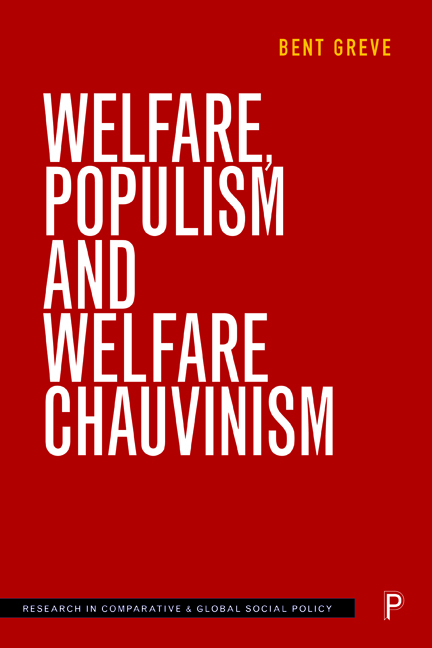Book contents
- Frontmatter
- Contents
- List of tables and figures
- Preface from the series editors
- Preface
- 1 What is it all about?
- 2 Basic concepts
- 3 Why inequality matters
- 4 Dualisation and the labour market
- 5 What form has the development in welfare spending taken?
- 6 Has social cohesion been eroded?
- 7 What do we know about citizens’ perception of the welfare state?
- 8 Populism, welfare chauvinism and hostility towards immigrants
- 9 Concluding remarks
- Index
3 - Why inequality matters
Published online by Cambridge University Press: 27 April 2022
- Frontmatter
- Contents
- List of tables and figures
- Preface from the series editors
- Preface
- 1 What is it all about?
- 2 Basic concepts
- 3 Why inequality matters
- 4 Dualisation and the labour market
- 5 What form has the development in welfare spending taken?
- 6 Has social cohesion been eroded?
- 7 What do we know about citizens’ perception of the welfare state?
- 8 Populism, welfare chauvinism and hostility towards immigrants
- 9 Concluding remarks
- Index
Summary
Introduction
We have seen an increase in inequality in many countries over the last 15 to 20 years. This chapter focuses on why inequality matters for welfare states, why we should have an interest in this topic and how this is related to issues of populism and welfare chauvinism. This is done by trying to systematise the knowledge we have on why inequality matters for, and in relation to, economic growth, for health and for social cohesion. It also discusses why trickle-down economics does not work. The development in inequality is analysed by showing the development using traditional aspects such as the Gini coefficient, but also reflecting on, and showing, data on inequality in health and how this can be seen as connected to change in economic inequality. Real-wage development is also included as a reason why there has been increasing inequality (see also the data presented in Chapter 5), combined with inequality in wealth and capital income. As such, even if people get a job (as is the focus of Chapter 4), this is not a guarantee that they will have a standard of living above the poverty line, so, in fact, being the working poor. Inequality is not just an issue related to the economic sphere of societal development, and therefore the last section points towards other types of inequality because inequality in the economic part of society also has implications for other spheres of society.
The chapter does not look into equality issues related to, for example, the hidden economy or the use of tax planning and/or tax havens to put money aside so that rich people have low taxation on income, or income from wealth that they do not pay any tax on. This is despite the fact that looking into inequalities in wealth will, presumably, indicate that the degree of inequality is higher than often depicted, and certainly also that the ability to both avoid and evade paying taxes will cause even higher inequalities in the years to come, unless an international agreement is made to close tax-evasion loopholes. To a more limited extent, the chapter also looks into the possible political reasons for the development, although only a few aspects are presented (for two types of political explanations, see Hopkin and Lynch, 2016).
- Type
- Chapter
- Information
- Welfare, Populism and Welfare Chauvinism , pp. 39 - 56Publisher: Bristol University PressPrint publication year: 2019



